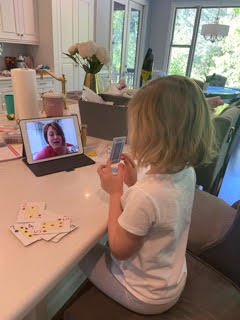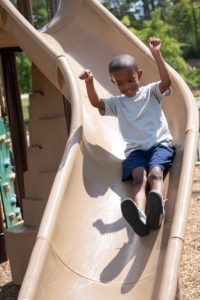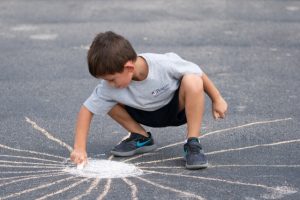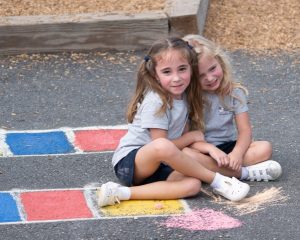By Smarty Guest Bloggers Sybil Cohn, Palisades Episcopal School Lower School Director & Melissa Puno, Palisades Episcopal School Middle School Director
Pivot. New normal. Pandemic. Unprecedented times. Are you rolling your eyes? Because we often do when we hear those words. The list goes on of those dreaded words that we would not have predicted just months ago would become overly used in our everyday conversations, nor could we have imagined the reasons for their overuse. But this IS our new normal. And we HAVE had to pivot during this pandemic and these unprecedented times. While we are all experiencing this situation, why do we feel so alone? If everyone is in this together, why is it so hard to do what everyone else in the world is having to do, too?
The unknown is stressful. And there is A LOT of unknown going on right now! It is helpful to rely on what we do know during these uncertain times. As Directors of Palisades Episcopal School’s Lower and Middle Schools, we decided to make a list of our top 10 helpful tips for parents during emergency remote learning, and realized that the majority of these are tips we would give parents at ANY point in time, emergency remote learning or not. We are relying on best practices for children, not best practices for children during COVID-19.
1. SET A SCHEDULE – Children work best on a schedule when they can predict (loosely) what is going to happen next. The key is to establish a schedule that works for your family. Wake up and bedtimes should remain fairly consistent, even on weekends. There is a reason your iPhone encourages you to set those alarms. Even our technology encourages us to have a consistent sleep pattern. Set a time to have lunch each day. Determine how long your child can work before they need a break and then take one. Our youngest learners typically can only sustain the same activity for 10-15 minutes before they need a change (a brain break, move from the floor to the table, switch activities). Factor breaks into your family schedule. What works for one child might not work for their sibling, so Sally’s schedule as an eight-year-old might be different from Billy’s schedule as a four-year-old.
While older students may buck school and parental schedules, in many ways pre-teens and adolescents crave routine. The predictability of schedules fosters an element of stability in a teen’s already chaotic world. Additionally, schedules and timers enable teens to develop the time management skills they will need in school and beyond.
2. ENCOURAGE PLAY – Children learn through play, particularly our younger learners. Play is work for them, and learning how to play is actually a skill that needs to be developed. While we are unable to develop the social skills involving in-person play with peers right now (sharing, taking turns, resolving conflicts), this is the perfect opportunity to encourage your child in independent play and imaginative play. To facilitate independent play, offer a few choices of activities in which your child can participate with no help from you (Legos, blocks, drawing, action figures/dolls), and then let them explore on their own. Start small (10 minutes for preschool-aged children) and gradually increase the amount of time children are left to play by themselves.
Structured play is also a critical component of middle school education. Through experimentation, kitchen science, theatrical performance, and engineering challenges, teens play with learning, thereby developing a deeper understanding of content and building problem-solving strategies.
3. BALANCE SCREEN TIME – While screen time is always a concern for children (that’s why the doctor asks that question at your child’s annual checkup), we can’t avoid the use of screens right now. The trouble is not necessarily that the students are now learning online, but rather that this academic screen time is compounded by the other daily activities requiring screens. From gaming to Facetiming friends to “snapping” on Snapchat to hours of the Disney channel, children are now engaged in both social and academic screen time, which, in many cases, is excessive.
The key is balance. Students should alternate between viewing video lessons/conferences and reading actual paper books, drawing and handwriting, movement and physical activity, and play. Monitoring the “down” time, though, is equally critical. Provide opportunities for your child to socialize and relax off-screen to balance the on-screen demands of school.
4. SUPPORT SOCIAL-EMOTIONAL HEALTH – As part of our mission at Palisades Episcopal School, we develop the mind, body and spirit. It is extremely important to us that our children grow and are healthy in all aspects of their being. As such, “stay-at-home” orders are in some ways more concerning socially and emotionally than they are academically. School is about more than just curriculum and skills; rather, children learn invaluable lessons at school about friendship, compromise, collaboration, and leadership. And, just as isolation creates physical barriers, the social-emotional disconnects can be particularly disheartening for children. Setting up virtual play dates, organizing online pictionary games, even playing Zoom charades are ways for kids to hang out and feel connected.
Don’t let your teens fool you. While they may insist they are “fine,” teens need socialization more than anyone, and they often do not know how to initiate and arrange social activities. Help your teen organize video conference dance parties, game nights, study groups, and group lunches. They may not think to thank you, but their improved attitudes will be thanks enough.
5. PERMIT MISTAKES – We wish we could quote Jessica Lahey’s entire book, The Gift of Failure, to you because there are so many gems found within it. The message is so simple, yet so hard to allow to happen sometimes. We hate to see our children struggle or (gasp!) fail. Doesn’t it feel like a reflection of us as their parents if our child can’t do something well? The greatest learning comes with a bit of struggle. Physiologically, our brains don’t remember a task or activity that we breeze through as well as one in which we have to focus our attention towards. There needs to be somewhat of a challenge presented. While we never want our children to struggle to the point of being overwhelmed, it is okay for an activity to be challenging so that they have to work towards an understanding and develop a sense of accomplishment.
For adolescents, the opportunity to safely fail is one of the more important lessons to be gleaned from the pandemic. Virtual learning requires time management, self-discipline, self-control, and, most importantly, self-advocacy — some of the most critical skills developed in the middle school years. And, while our current situation could be ideal to foster these skills in our teens, it also comes with an unfortunate crutch – mom and dad are home! Middle school teachers realize that they must be both cheerleader and coach. We spend years mastering the art of the “send back” — our students come to us frazzled with a thousand questions, we ask a question or two (rather than answer), and then “send back” our students with a warm “you got this” and a reassuring smile. It would be easy to answer, to solve, to fix, but in doing so we deprive our students of the greatest gift we can give them, the gift of autonomy.
Personally, as middle school teachers and moms, we can say it is challenging to “send back” our frustrated teen. We want to fix, to band-aid and heal, but the learning really is in the struggle, no matter how painful it is. So, leave the room, let your teen be, encourage your child to self-advocate and inquire of their teachers. They will figure it out, as long as we just let them.
6. IGNORE “I’M BORED!” – Boredom is actually a good thing because from boredom stems curiosity and innovation. While it sometimes feels as if we were put on this earth to be our child’s 24-hour entertainment concierge, that is not our job. Allow your child to be bored because it is at that point that they must get creative.
One of the greatest opportunities provided by the pandemic is time — time to rest, time to breathe, time to complete creative projects, and time to explore. Encourage your child to develop a new skill, to try something new. Maybe this is the time to dabble with guitar, to learn how to do a skateboard kickflip, to try needle point, or to cook coq au vin! There are a million and one how-to videos online for your child, and you, to explore.
7. PRIORITIZE – This is a great time to develop this life skill. Right now, it seems like there is SO MUCH! We have to get our kids on Zoom calls, determine their work for the day, feed the family, keep the house in some semblance of order, stay current on the latest guidelines and protocols, all while trying to complete our own work. We’re exhausted just typing all of it. We need to prioritize, and we need to model how to do so for our children. Determine the “must dos” for the day and the “may dos.” For students, if your teacher hasn’t already labeled activities as required or optional, ask which tasks are the priorities. Typically focus on the core subjects of literacy (reading and writing) and math. While the rest of the subjects are certainly important and valuable, focus on the fundamentals if you have to choose. Once you identify the “must do” tasks, get those things done first. Anything else is a “may do.” If you get it done, great! If you don’t accomplish it, the world will keep spinning, and you can get it done another day (or not-sometimes you have to channel your inner Elsa and “Let it go!”).
This is also an ideal time for our teens to learn how to time manage and balance. Parents are the greatest models of these skills. We can model for our children how to schedule our time, how to say “no” to those activities that interfere with our overall plan, and how to engage fully in a few activities rather than spreading ourselves thinly across too many.
8. FOCUS ON THE POSITIVE – It is REALLY easy to jump on the “Negative Nelly” train right now because there is plenty of it around us. Instead, show your child how to turn that frown upside down and point out the positives in each situation. A change in perspective and attitude can completely change how we approach or react to a situation. It definitely takes practice, so train your brain (and your child’s) how to take those lemons that life is handing us and make some lemonade.
It is also a great time to discuss greatness with your teens, in life and in leadership. At dinner, pose thought-provoking questions like, “What does it mean to be great during challenging times?” or “How does a leader lead differently or the same during a crisis?”. While our teens may not have as many opportunities to practice leadership at home, they can discuss it and rehearse how they might handle challenges in the future through rich dialogue.
9. OFFER GRACE – We might be teetering on another overused word here, but we’ll roll the dice and go with it because we feel it’s important (and yes, we are speaking to ourselves as well). Start with yourself and give yourself grace. This is hard! We are facing a situation in which none of us have ever been before. There is not a rulebook that lays out a plan to tell us how to proceed (believe me, the rule-following planners in us would be hitting “Buy Now” on Amazon in a split second if it were available!). We are all doing the best we can, and we have to tell ourselves that this is good enough. Admittedly, we are both perfectionists and “good enough” doesn’t sit well with us! We (like so many others) tend to hold ourselves to the highest of standards, and at times like these, this is completely unrealistic. We are writing new standards every day, sometimes every hour as things change, and “good enough” is actually exceptional right now. Give yourself and others grace as we all do the best we can each day.
10. BUILD RESILIENCE – Children are resilient, and they are going to come out of this just fine. As parents, we constantly stress and worry about how we are raising our kids. We have a responsibility to inspire and mold our children, but we often fear that every opportunity missed is a “missed opportunity.” But, the reality is that, while COVID-19 will be forever a childhood memory, ultimately, to quote Maya Angelou, our children “will not remember what [COVID 19] did, but how [it] made them feel.” They will remember time spent with family, longing to get outside, missing teachers and friends, and the strange way we all looked in our masks and surgical gloves. They will not remember spelling tests and practicing multiplication.
Many parents worry that the change to online learning will create educational gaps, and that their children will be behind when they return to school in the fall. However, great teachers are magical. They know how to assess student learning, how to design appropriate instruction, and how to meet students where they are. Talented teachers adapt with their students in order to provide instruction to address their students’ needs. Rather than focusing on what skill and content might be missed, this new normal is embraced as an opportunity for America’s children to deepen their optimism, to witness great courage in action, and to see compassion and humanity in their closest family members and in the kindest strangers. Just like the toddler who tumbles down the front step only to pick herself up and toddle on, our children will bounce back. They will be great, regardless of COVID 19 and because of it.
Palisades Episcopal School
13120 Grand Palisades Parkway
Charlotte, NC 28278
704.583.1825
Website | Facebook | Twitter








1 comment
I just like the helpful information you provide on your articles.
I’ll bookmark your blog and test again here frequently.
I’m rather certain I will be told lots of new stuff proper here!
Good luck for the following! https://Www.uri365.net/